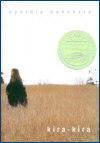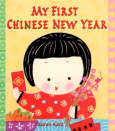|
The AACP Newsletter |
| Asian American Curriculum Project, Inc. - Books for All Ages |
| Since 1970 | AsianAmericanBooks.com | March 2005 |
|
|
||||||||||||||
|
Enough is Enough A second editorial by Leonard Chan and Philip Chin |
|
|
As you may recall from our past newsletter articles on this case, the He (the biological parents) and Baker families are in a bitter custody case over Anna Mae. Anna Mae, who is now six, is the biological daughter of Qin Luo ''Casey'' and Shaoqiang ''Jack'' He. The last court case left Anna Mae in the custody of the Bakers. The Tennessee Court of Appeals in Jackson is currently hearing the case.
Here are some links to articles that will help you learn about the He vs. Baker case. First of all, I don't know all the details of this case. All I know about the case is from what I read on the Internet and in newspapers. Plus I am not an expert on families and child psychology. But as a casual observer, I must say enough is enough. Let's please hope the court makes the right decision this time and gives Anna Mae back to her biological parents. Besides the cultural bigotry issues that we explored in our last editorial on this subject, here are my latest thoughts on why I think the He family should get their daughter back. |
To the Baker's - What about when Anna Mae starts to wonder about her Chinese heritage, will you keep her from it as an added barrier because you want to sever all ties to her biological parents? Wouldn't Anna Mae's exploration of her Chinese heritage only serve to remind her of the family that was kept from her? And if you keep Anna Mae from her Chinese heritage might you be doing her harm by not letting her know her true identity? She'll probably feel more like a kidnap victim than an adopted child. What psychological traumas will this cause? It's tough enough for an adopted child to deal with the issues of being adopted, but unless you decide to hide the court cases from her and move to some deserted island, keeping Anna Mae will only bring major pains to you and her. No amount of money or well-heeled nurturing will prevent this. Do you truly have Anna Mae's long range interest in mind or just your own current self-interest? |
The following books are discounted for subscribers to our newsletter. The discounts on these books end April 5, 2005. | |

|
Swimming in the American
By Hiroshi Kashiwagi |

|
Peek!
By Minfong Ho |

|
Kira-KiraBy Cynthia Kadohata2004, 244 pages, Hardback. Kira-Kira is a poignant story of two Japanese American sisters coping with moving to Georgia, 1950s and 60s racism, poverty, adolescence, and finally illness. Through it all they're able to find the Kira-Kira (glitter) in life. Kira-Kira was recently honored with a Newbery book award for children's literature.
View Additional Information |

|
My First Chinese New YearBy Karen Katz2004, 27 pages, Hardback. Here's a book that I didn't get to in time for last month's Chinese New Year celebration. But it's never too late for kids to enjoy and learn from such a nice book. Author and illustrator Karen Katz does an admirable job of capturing the customs of Chinese New Year and making it accessible to young kids.
View Additional Information |

|
The MatsBy Francisco ArcellanaIllustrated by Hermès Alègrè 1999, 20 pages, Hardback. A father comes home from a trip to Manila with beautiful hand-made customized sleeping mats for each member of his family. This award-winning book is a touching story of reverence and adoration of departed family members. First written in 1938 and then more recently adapted into a picture book, AACP is delighted to present this book to you now.
View Additional Information
|
Copyright © 2005 by Asian American Curriculum Project, Inc. (a non-profit organization since 1970)
Visit our website at AsianAmericanBooks.com
To unsubscribe simply reply to this email and type "REMOVE" in the subject line.